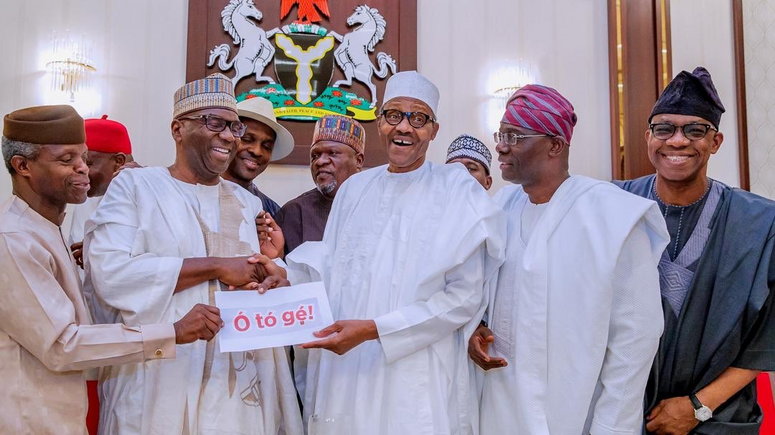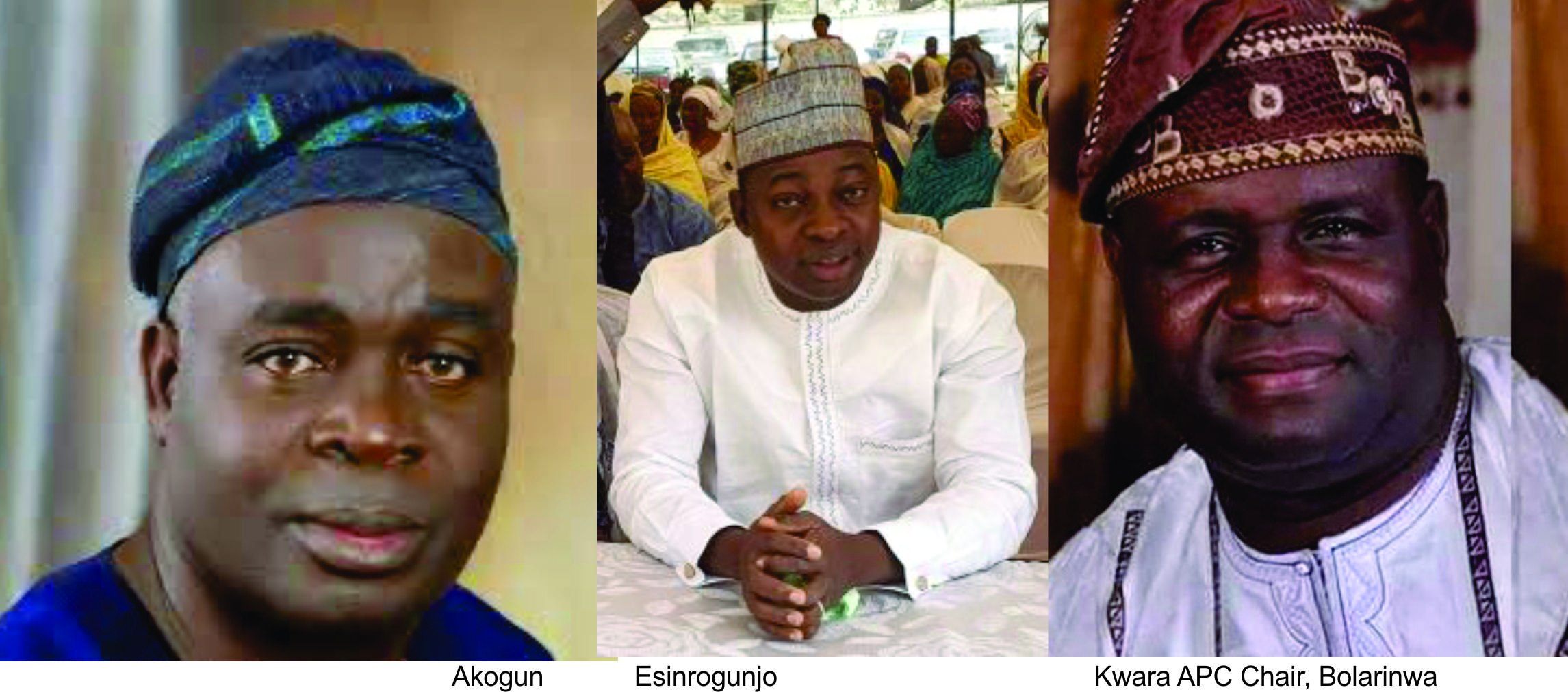
By Supo Atobatele
From O to ge (enough is enough) to O tun ya (let's start again), the theme of Kwara's contemporary political oddessy has remained an allegory of thespian proportions.
Birthed in the unlikely star character of Abdulrahman Abdulrasaq, the poker-faced scion of the illustrious AGF Rasaq dynasty in Ilorin, this riveting soap may yet determine the tenor and direction of the movement which ensured the cataclysmic collapse of the 40-year-old Saraki political empire.
In a way, the Otoge movement on which Abdulrahman rode to Government House last year is a microcosm of the APC rainbow coalition which sacked the Goodluck Jonathan administration at the centre in 2015.
Made up of a coterie of strange bedfellows united by a common enemy in the urbane former Senate President, Bukola Saraki, the groundswell of opinion within the opposition in those heady days preceding the 2019 general elections was to secure the seat of government first and later to share the spoils of office.
One year on, it does appear the fragile strands holding together the leading lights of the opposition movement are loose and floundering, bringing to the public domain the disquiet within the ruling party in the state.
How did a family disagreement within the party become the current public spat in the market place? The answer may well be in Abdulrahman 's decision to be his own man. To be sure, the governor's unorthodox style of governance may have served him well in fast tracking the delivery of dividends of democracy to the people.
Indeed, acolytes of the administration are quick to point to the many achievements of the governor in the last one year, signposting a new era in infrastructural and human capital development.
Understandably, Rafiu Ajakaye, the spokesman of the governor is ecstatic whenever he is highlighting the gains of the last 365 days.
He says: " Kwara, for the record, is not yet an eldorado. No such state exists. But the administration inherited and has rescued a state that once tottered on the brink of collapse — at least in the area of human capital development indices. Basic healthcare was comatose.
" Children were no longer getting vaccination to curb deadly diseases, including polio, because the state was not fulfilling its obligation in the national campaign.
" The state held the trophy in children malnutrition in the north central. Kwara had also been blacklisted from the universal basic education commission (UBEC) after funds meant for primary education were mismanaged, coming last in the UBEC ratings.
" The Colleges of Education (COEs) had been run aground, with their workers owed several months in salary arrears. The school of midwifery had lost its accreditation. Access to potable water was majorly through rickety tankers.
" The state-owned broadcast stations were off the air. Kwara ticked all the wrong boxes in the World Bank ease of doing business ratings, while pensioners could hardly recall the last time they were paid.
" Another mark of its pitiable condition was the fact that no college graduate — having been told of the horrible state of its orientation camp — wanted to have their national youth service in Kwara.
" Just 12 months down the road, the Otoge leader has successfully changed the Kwara narrative. From instant payment of relevant counterpart funds, which have brought back development partners, and taking the state off the UBEC blacklist, AbdulRazaq is taking steps to stabilise and reposition the state for growth."
Perhaps so and even more. In the health sector, the administration has sunk N232million into tackling malaria, maternal death, and malnutrition. It has also launched an insurance scheme for 10,000 indigent Kwarans while renovating 37 primary health centres.
This is in addition to the more than 70 new medical personnel, including doctors, that have just been recruited to strengthen the health sector that had all but collapsed under the rudderless Abdulfatah Ahmed administration.
On road infrastructure, the administration says its 68 township, urban roads, or mini-bridges linking major communities have either been completed or are ongoing across the state.

It is also rehabilitating 31 schools across the state, seven of which are undergoing complete overhaul in an initiative expected to gulp a whopping N1.7 billion.
Not only has the administration removed the state from the UBEC blacklist, it is also set to access the over N7billion trapped there while students in tertiary institutions now have cause to smile with the transparent electronic windows put in place to ease the burden of bursary payment and check fraud.
While there had been considerable positive changes across other sectors such as agriculture, water and judiciary, civil servants and pensioners are perhaps the greatest beneficiaries under the present dispensation with the regular payments of salaries, pensions and gratuities.
But at a time the governor appears to be redefining the governance model in the state by interfacing with the ordinary people on the streets through personal engagements and interactions, it is ironic that his populism appears to be ostracising his foot soldiers in the Otoge movement.
Aggrieved members of the Otoge movement told this newspaper that the governor is running " a one-man administration."
They readily cite the December 2019 constitution of the governor's cabinet which they said did not have the input of party leaders, including Information Minister, Alhaji Lai Mohammed and his Transportation counterpart, Gbemi Saraki. While many had commended the governor for giving the youths a shot at governance, his erstwhile political allies are seething in anger at being abandoned.
Investigation by Midland Post indicated that the governor may be building his own political structure ahead of an imminent faceoff with his former political benefactors. It was learnt that the governor has created his AA Group, a supposed grassroots-based political outfit with presence in the 16 local governments, much to the chargrin of party leaders in the state.
Only recently, a group, Kwara State APC Integrity Vanguard, apparently ventilating the position of the aggrieved in the party, had petitioned the National Chairman of the party, Adams Oshiomhole, over its grouse with the governor.
The group, in its petition signed by Alhaji Abdullahi Yinka Onimasa, National Coordinator, and Comrade Kayode Aliyu Bamidele, Secretary-General, accused the governor of usurping the party’s structures.
The angry petitioners, who had copied President Muhammadu Buhari, Senate President, Ahmed Lawan, and Speaker of the House of Representatives, Hon. Femi Gbajabiamila, lamented what it termed “the disgusting development in Kwara State APC."
The frustration of the aggrieved members may have reached a crescendo with the latest arrest of Musbau Esinrogunjo, one of the most visible foot soldiers of the Otoge revolution, who was alleged to have been caught in a viral audio recording threatening to " kill" the governor for abandonment.
Akogun Iyiola Oyedepo, another prominent foot soldier of the revolution and one of the quartet that launched a blistering campaign on the radio against the Ahmed administration and the Saraki dynasty, offered an insight into the deep divisions within the ruling party.
" Several calls have been put to me on Comrade Esinrogunjo’s audio recording. The last time I saw Esinrogunjo was 31 January, 2020.
" That was the day I unveiled my Nations Leadership Institute. The Speaker of Kwara State House of Assrmbly, Rt. Honorable Danlad Yakubu, did the unveiling. Esinrogunjo was one of the invitees.
“When the young man complained about his frustrations about the government, I told him about the brewing intra-party crisis which I said could be worse than inter-party crisis.
“This has been my view about unreasonable intra-party crisis that has engulfed APC Kwara chapter, shortly after our party and our government assumed office.
" This same view I had aired before the Governor of Kwara State when I, along with six elders of our party, were before him before the close (of) 2019.
“This same view I aired before the brother of the governor, Dr Alimi Abdulrazaq and five others sometime in the month of January, this year. I stand by my view that intra-party crisis should not be our main programme after our landslide victory of 2019.
“I am not a politician of violence as I do not have that record. Killing a governor for whatever reason should not be contemplated by anybody. I am not in the habit of any outburst against this government, despite the opposition’s provocation to do so.
“I am of the view that the governor should be left to run his government as he pleases. Future is the acid test of values; it is time that will tell whether the governor had been right or not. I did not participate in liberation politics for personal benefits.

“I am already fulfilled now that we have redefined Kwara politics. Generations to come, I am sure, will hail my stand and contributions in Kwara politics.
" That is bigger and greater than holding an office. I really do not want anybody to intrude into this my dignified silence. Whatever is between the governor and Comrade Esinrogunjo is really not my concern.”
But Chief Wole Oke, another veteran of the liberation movement and Third Republic leader in the State House of Assembly, believes the current crisis was created by the void in political leadership after the exit of the Saraki dynasty.
“We were simply members of the same political ideology. We believed that our common political enemy was Saraki’s dynasty.
" We had no leader as it were. We were just fighting the common ‘foe’ according to our capabilities.
“So when the victory was won, we lacked direction. Each member saw himself as a victor, having fought from his own angle. For instance, how would I call the honourable Minister (Lai Mohammed) my political leader?
" I had been in the forays of political struggles for almost three decades now! I think, this is where the problem emanated from," he said in an interview.
With the simmering crisis in the party threatening to torpedo the gains of the last one year, many concerned party members are calling for external intervention to save the party from itself if it is to retain its hold on power amidst the closing of ranks by the rump of Saraki's disoriented followers.
Chief Rex Olawoye, a veteran grassroots politician who was among those who fought the battle of the airwaves against the previous administration, expressed worry over the new direction of the party.
“Definitely we need some intervention from our elders outside Kwara to bring the aggrieved groups together. They should be able to call a spade a spade,” he told a national daily.
This external intervention, some say, may readily come from Prof. Ibrahim Gambari, the austere Chief of Staff to the President
not known to be linked to any of the contending forces in his home state of Kwara.
A brilliant diplomat and strategist who had interfaced successfully with some of the most despicable despots in his decades-old tour of duty as an ambassador of the United Nations, Gambari had brought peace to some of the tempestuous regions of the world.
Would he rise to the occasion and deploy his seminal intervention to save his home state from the hovering portents?




Comments powered by CComment